Democracy versus Dictatorship:
The two World Wars of the 20th century were declared to have been fought for the defence of democracy. In the first War, the slogan was, ‘Hang the Kaiser’, while the declared goal of World War II was to kill the dictatorship represented by Hitler and Mussolini and to make the world safe for democracy. During the days of the French Revolution, too, men fought and bled for the sake of democracy. The history of the world shows that the plant of democracy is watered by human blood and calls forth human sacrifice. Nothing worth achieving was ever achieved without suffering and sacrifice. People have to go through the fire of suffering and give riverfuls of blood before they are fit enough to rule. Byron, the great hater of kings and kingdoms, said, “Blood will flow like water and tears like mist, but people will conquer in the end. I will not live to see it but I foresee it”.
Dictatorship means one man’s rule. He is all in all. The masses are dumb-driven cattle, who must bow to the command of the dictator or else be slaughtered. Theirs is not to reason why, theirs is not to make reply, theirs is but to do or die. We have seen examples of glorious dictatorships: Stalin in Russia, Hitler in Germany and Mussolini in Italy. When a nation is down-trodden and depressed, a dictator certainly can raise it to great heights. The public cries for a strong man; they have lost confidence in themselves. A dictator appears on the scene. He is a great man who does great things in a great way. The dispirited masses applaud him, the people worship him, a halo grows around him, he becomes the object of hero-worship; he can enthuse his countrymen, and make them move on the wave of enthusiasm. People take him to be a superman or a god. He talks in the language of thunder and lightning. He fills the whole nation with intoxication and exuberant hope in their own destiny. They suddenly discover that they are no ordinary people, but are the special favourites of God, created with a superior character and culture, born to rule over the world. The dictator is a superman. He injects a superiority complex into his nation. A new heaven and new earth seem to open out before them. The leader says, “Give me blood, and I give you the whole world. Give me obedience and I give you a glorious country and a glorious future. Follow me blindly; lock for a while your reason within your brain. I call for action and sacrifice”. The people, mad with excitement, follow him. A few objectors are liquidated. Political opponents are purged. As Hitler said, “Shoot first, shoot last, shoot all the time”. Anyone who differed from the dictator was quickly given a bloodbath. No judge, no High court could defend the life or freedom of a person. He must fall in line or fall down to hell. “Thou shalt have no other god before me,” expects a dictator. “Those who are not with us are against us. They are the enemy agents, traitors, spies or saboteurs. Finish them, so that our progress may begin. Let them die so that the Fatherland may live”- such is the burden of a dictator’s song.
A dictator rises like a meteor; with him rises his country. Germany lay fallen and frustrated; Hitler gave it new blood, new life, new hope, new energy in a short while. The despised and defeated Germany of 1918 became the first-class power and, in 1939, challenged the whole world to war. Its lightning victories over the whole of Europe, including large territories of Russia, will ever remain the most glorious chapter in the history of Hitler’s Germany. Then the German dictatorship came up against the bigger dictatorship of Soviet Russia and the stronger arm won and Hitlerite Germany lay crushing and crushed on the war theatre. But Hitlerism had shown to what heights Germany could rise, given the right leadership. Turkey, once called ‘the Sick Man of Europe’, became very much healthy and kicking under the dictatorship of Mustafa Kemal Pasha. A country that was a theocracy, dominated by the mullahs, and which was steeped in purdah and past, was pushed up from its backwardness and became a powerful, modernized state in Europe. The progress under dictatorship was swift and spectacular. The same applies to pre-war Japan or Iran, where one man’s rule tore the red tape and took the nation to the pinnacle of glory. Even in the most democratic country of America, the President is the constitution-made dictator for four years.
But dictatorship cannot last except for a short time. The dictators come and go. For one thing, a dictator cannot leave a successor. A dictator rises; he raises the nation to great heights; he shows them the light that never was on sea or land and then he is defeated, dismissed or dead and the country relapses into the former darkness and despair. This is the history of post-war Germany. War is the life breath of a dictator. Dictators shine in war and bloodshed. The dictator’s slogan is: “More guns, less butter”. He whips up war hysteria among his countrymen, who in their wild enthusiasm to win the war, forget the defects of domestic policy. If anything goes wrong on the home-front, the enemy is to blame. A dictator puts up a scapegoat, against whom the people can direct all their hatred. Hitler directed his people’s wrath and hatred against the Jews and against Englishmen and Americans. War is a dictator’s opportunity; it is his glory; it is the goal of his policy. He cannot show spectacular results in peacetime. He must keep people’s excitement at white heat. If the nation’s enthusiasm cools down, then the dictator has to climb down. For him, men are not human beings but tools for the furtherance of his policy and for the achievements of personal glory. Soldiers fight and die; he gets the credit for the victory. Men sacrifice and suffer, he shows his achievements to the world.
In World War II, Hitler first made Russia his ally. The people had no say. Later, he attacked Russia. A friend was turned into a foe, not because the German millions changed their attitude, but because one man, Hitler, changed his mind. A dictator holds in his hand the keys of peace and war. Thousands must go to war to be slaughtered merely because one man has willed it. He is all in all.
The dictators appear on the world’s stage for a while, shine and dazzle the world. They have their day and cease to be. They make brilliant history; they may leave footprints on the sands of time, but like Hitler and Mussolini, they hardly do any lasting good to their people. Besides, it is inconsistent with human dignity that one man’s word should be law and that millions be driven like sheep or goats, if not like automatons.
Democracy has been described by Abraham Lincoln as the government of the people, by the people and for the people. Democracy proceeds on the assumption that all men are equal and should have an equal vote. If Hitler had been born in England, he would have got just one vote, like the poorest adult. As Newman said, “England is the paradise of little men and purgatory of the great ones”. In England, the masses rule. The people are the masters, the government is their servant. They have appointed them by their vote, they can dismiss them by passing a vote of no-confidence in Parliament. In a democracy, you can dismiss your government sooner than you can dismiss your private servant. The Duke of Wellington saved England by defeating Napoleon at Waterloo, but the English people by their vote dismissed him from Prime Ministership. In our own time, Mr Churchill was responsible for England’s victory over Germany, yet when elections were held in 1945, Mr Churchill and his Ministry were dismissed at the moment of their victory in World War II. Democracy is no respecter of great men. It is not their slave.
In a democracy, the nation is strong, the government is weak. The people have all the power, the government holds office at the pleasure of the people. Under dictatorship, on the other hand, the government is strong and the nation is weak. All power is concentrated in the hands of the dictator, the nation has no rights or powers. The dictator’s will prevails. He may send a man to prison or concentration camp or the man may be killed. There is no freedom of life or property. As Shri J. P. Narain said, “In Russia, there is no freedom, except for the Communist Party”. That is the way of dictatorship. But under democracy, a Prime Minister can’t imprison or hang any person for personal differences or enmity. There are the courts, appeals and counter-appeals. For instance, in Democratic India, even the self-confessed assassin of Mahatma Gandhi had a very long trial and had all facilities of defence. He was hanged after two years after he had moved all the courts of appeal. Under a dictatorship, such a murderer would have been killed on the spot.
Under a democratic system, the Ministry is put into the saddle by the electorate. So the government has to serve the masses to get their vote at the next polls. Such a government has to devote attention to the education and health of the nation, to their economic betterment and general good. A dictator has no time for such peace-time pursuits. He resorts to war not to end the war, but for the sake of war to hush up discontent at home. Under democracy, the common man stands to gain.
Rousseau says, “Man is born free, but everywhere he is in chains”. If God has created man in his own image, then all men are equal, being images of God. Democracy is based on the idea of the divinity of man. When in Gita, Arjuna asked Lord Krishna, “Who is God?” Shri Krishna replied “I” and showed his Grand Form to him. The idea is- God in man. The American Declaration of Independence lays down that all men are created equal, that that they are endowed by their Creator with certain inalienable rights, that among these are life, liberty and pursuit of happiness. Democracy assures the dignity of the individual.
Of course, nothing in the world is perfect and critics have drawn attention even to the defects of democracy. Democracy lacks secrecy and speed. If in a war, a Democratic country wants 4,000 tanks or aeroplanes, the government will move a bill in Parliament. There will be three readings of the bill and long, unending speeches by the members. So much time will be wasted and the whole world would know the secret. A dictator, on the other hand, has just to sign a paper and the thing is done with secrecy and speed. Dictatorship is better for war times, but democracy is ideal for peacetime. Again, it is objected that democracy lays emphasis on quantity, not on quality. The opinion of a hundred foolish voters can’t be equal to that of one Plato or one Newton. Should the train be run by one driver, who knows his job, or by asking the majority of the passengers, who know nothing of that technical job? Democracy may degenerate into mobocracy. As Bernard Shaw says, “Democracy substitutes election by the incompetent many, for appointment by the corrupt few”.
There is a story in the Bible, which describes some men quarrelling over leadership. Christ said, “Let him who is the servant of all, become the leader of all”. The Prime Minister is the first servant of the people. Broadcasting on 15th August 1947, Shri Behru said, “Today I address you for the first time officially as the First Servant of the Indian people, pledged to their service and their betterment. I am here because you willed it so and I remain here so long as you choose to honour me with your confidence”.
Gandhiji said, “Democracy is not a state in which people act like sheep. Under democracy, individual liberty of opinion and action is jealously guarded”.
Democracy is so much in fashion that even Communist countries like China, which have dictatorships, call themselves ‘People’s Democracies’.
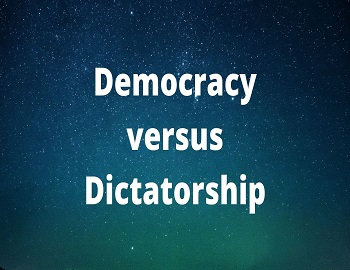
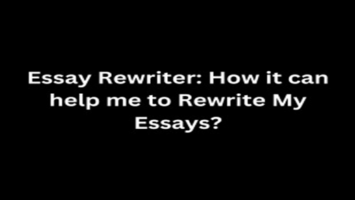
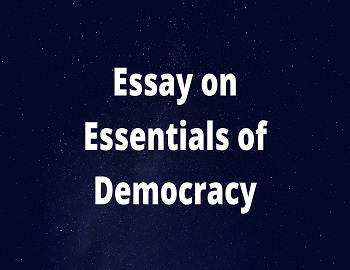
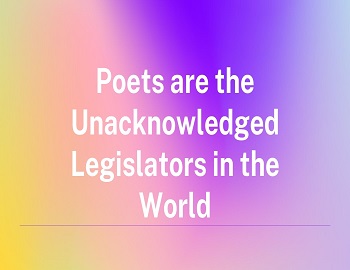
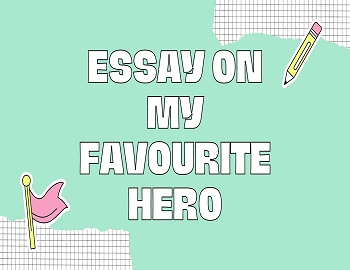

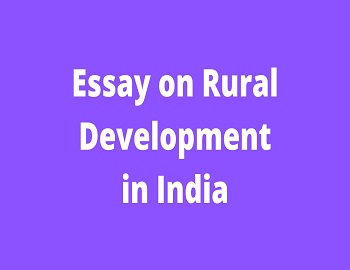
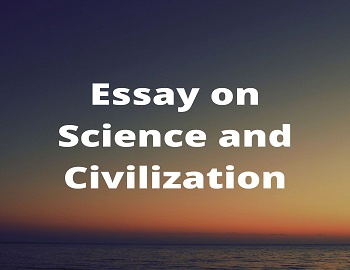
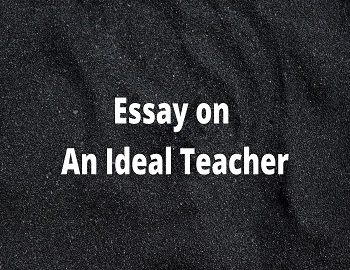
Comments (No)